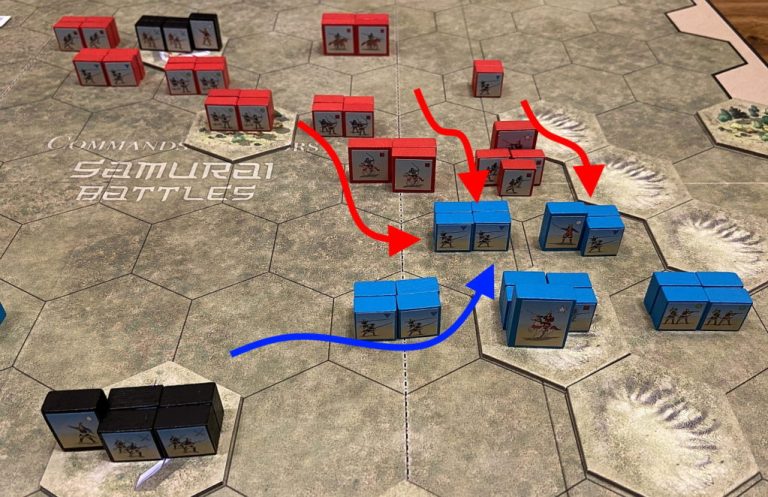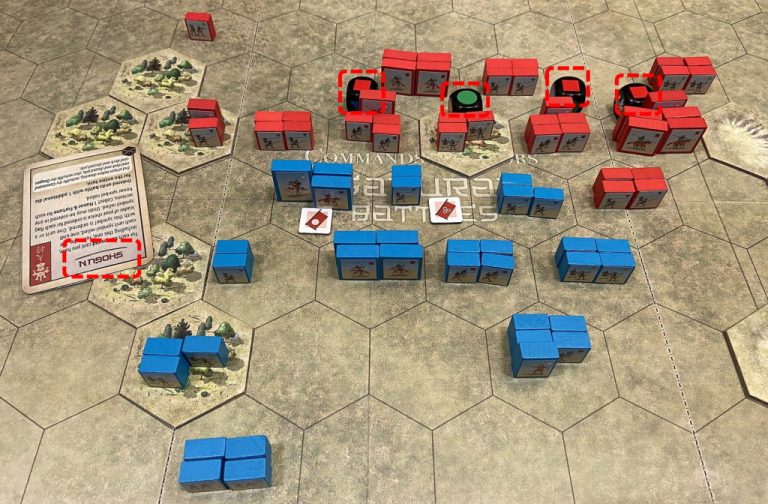With great pleasure I played another two scenarios in Samurai Battles – it hit the table already for the fourth time in the last month so you can see what a great impression it had on me! With Lukasz we focus first on multi set-up engagements, which span across couple of chronologically connected battles. So far we have covered Arita Castle 1517 AD, Okehazama 1560 AD and Koriyama Castle 1540 AD. This time the choice was Azukizaka combats – one in 1542 and the second in 1548.
Samurai Battles Session reports: Arita Castle 1517 AD - 2 scenarios Okehazama 1560 AD - 2 scenarios Koriyama Castle 1540 AD - 4 scenarios
The Game
Let me first provide some more information about the game for those who have not heard about it. Above I am also placing a demo how the game flow looks like.
Commands & Colors: Samurai Battles allows players to portray important engagements of Japanese history mainly regarding the XVI century. The battles, included in the thick scenario booklet, focus on the historical deployment of forces and important terrain features in level with the game system. The scale of the game is flexible and varies from battle to battle. For some scenarios, an infantry unit may represent an entire clan of soldiers, while in other scenarios a unit may represent just a few brave warriors.
The game follows the well-proven mechanics of Commands (cards driving the moves and creating Fog of War) and Colors (the units designation, having huge impact on battle results). The dice allow us to quickly resolve all battles and the components in the box allow for creation of countless scenarios. In essence, Richard Borg at his best!
And now let us move to reports!
1. First battle of Azukizaka 1542 AD
Historical Background
The Oda and Imagawa were great rivals, but fighting between these two families was rare, for the two were separated by the dominions of the Matsudaira family. In 1542, however, Oda Nobuhide and Imagawa Yashimoto, seeking to extend their influence and reacting to moves by the other, both advanced into Mikawa. The armies met at Azukizaka, near the Matsudaira capital of Okazaki. The Imagawa army’s vanguard was led by a brave warrior, Yuhur, but was quickly overpowered by Oda Nobuhide and his three brothers.
Session Report
So that another meeting with Lukasz and session with Samurai Battles was planned as a group of the linked, chronological and logically connected scenarios. As mentioned, we have chosen the Azukizaka battle. What is very interesting and special about that mini-campaign is that it uses exactly the same terrain features and units in both battles – it is the units disposition & cards number which make a difference. Pretty interesting approach and a complete novelty to me. I was to play the more difficult side (blue blocks, Oda) while Lukasz will be of charge for slightly stronger army (red block, Imagawa)
We started from the 1542 engagement – a very balanced set-up, with both sides having similar forces and Command Tents.






It was definitely a more decisive result than I expected based on the forces disposition and set-up. Still, completely in line with the historical resolution!
2. Second battle of Azukizaka 1548 AD
Historical Background
In 1548 Oda Nobuhide led an army into Mikawa, his objective being the Matsudaira’s capital city of Okazaki. Matsudaira’s young lord, Hirotada, turned to Imagawa for assistance and agreed to provide his only son as a hostage in return for help, but the child was abducted by the Oda in route. Imagawa Yashimoto still fulfilled the bargain and called on his uncle, monk-general Taigen Sessai, to march out to meet Nobuhide. Sessai set-up an ambush of sorts and although the fighting was desperate, Nobuhide was defeated and thus avenged the earlier loss at the same site some six years previously.
Session Report
Six years passed and the time has come for a re-match. Same terrain, same units, completely different, more confrontational set-up. What will happen this time?




Again, a historical result and tons of occasions to score VPs which I did not manage to exploit (those 1-block units escaping). Plus one of the best Shogun plays I have seen so far.
Summary
Interestingly, that was another evening of decisive victories and crushing defeats. They all went in historical order but I have a feeling that once you start to lose, a snowball effect starts. The final score was Lukasz victory:
- Michal (Oda) 6 – Lukasz (Imagawa) 8
More reports approaching – stay tuned!







